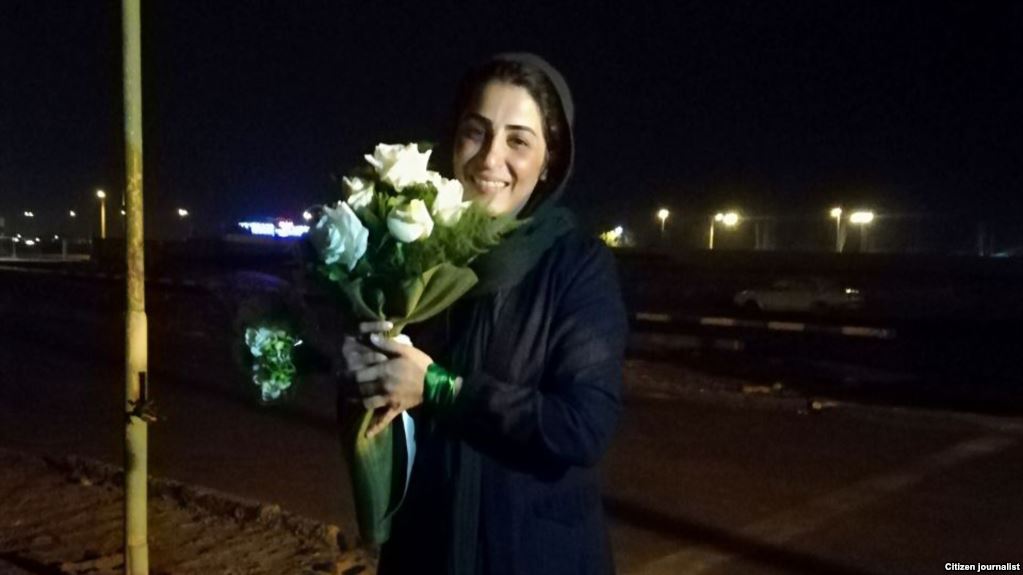Prominent Iranian Human Rights Lawyer to Appeal Hijab Protester’s Prison Sentence

Narges Hosseini smiles for the camera after being released on bail from Gharchak Prison in February 2018.
Nasrin Sotoudeh: Iran’s Constitution Makes No Mention of the Mandatory Hijab
A woman who was sentenced to prison in Iran for removing her headscarf in public is being used as an example to dissuade others from repeating the peaceful protest against the compulsory hijab, according to prominent human rights attorney Nasrin Sotoudeh.
“What Narges did was appear in public without the hijab, that much is true,” Sotoudeh told the Center for Human Rights in Iran (CHRI) on March 10, 2018. “But in court, she was tried for ‘encouraging corruption,’ as if she ran a house of prostitution.”
“In order to create fear, the judiciary is exaggerating alleged crimes and trying to impose heavier punishments; that’s against the law,” she added. “Imposing judicial pressure puts fear and dread into those who want to protest.”
Narges Hosseini, 32, was detained on January 29, 2018, for removing her headscarf on a busy street in central Tehran and waving it on a stick like a flag.
Two months later, the sociology graduate student from the city of Kashan, Isfahan Province, was sentenced to 24 months in prison—21 months suspended for five years—for the charges of “encouraging people to engage in corruption by removing the hijab in public” and “committing a forbidden act in a public space.”
The ruling will be appealed, according to Sotoudeh.
Legal Protest or “Haram?”
All women in Iran are forced to cover the skin on their bodies (excluding the face) and their hair when they are in public. This rule was imposed after the country’s 1979 revolution by then-Supreme Leader Ayatollah Ruhollah Khomeini.
Women who fail to cover themselves in public could be arrested, fined, lashed and imprisoned for committing “haram.”
According to Article 638 of Iran’s Islamic Penal Code: “Anyone in public places and roads who openly commits a harām [sinful] act, in addition to the punishment provided for the act, shall be sentenced to two months’ imprisonment or up to 74 lashes; and if they commit an act that is not punishable but violates public prudency, they shall only be sentenced to 10 days to two months’ imprisonment or up to 74 lashes.”
However, according to Sotoudeh, the Islamic Republic of Iran’s Constitution makes no reference to the hijab.
“The Constitution, ratified in 1980, and its amendment, ratified in 1988, make no mention of the mandatory hijab,” she told CHRI. “Also, don’t forget that many of the women who voted for the Constitution in the national referendum [in 1980] were not wearing hijabs.”
She continued: “My client’s action pertains to Article 638 of the Islamic Penal Code. But the court has unlawfully accused her of violating Article 639. Besides that, even Article 638 itself is unconstitutional because the right to choose your clothing is one of the most basic concepts of freedom, which the Constitution respects for women and men equally.”
According to Article 639 of the Islamic Penal Code: “The following individuals shall be sentenced to one year to 10 years’ imprisonment… A – Anyone who establishes or directs a place of immorality or prostitution. B – Anyone who facilitates or encourages people to commit immorality or prostitution.”
Responding to Tehran Prosecutor Abbas Jafari Dowlatabadi’s objection to the suspended portion of Hosseini’s sentence, Sotoudeh said she wished the prosecutor had felt as passionately about the acquittal of alleged sex offender Saeed Tousi.
“Instead of spending time on the Girls of Revolution Street, the prosecutor should have prosecuted Saeed Tousi or taken action against the policeman who thought it was his duty to violently push a woman in plain sight for the world to see,” Sotoudeh told CHRI.
The attorney was referring to Maryam Shariatmadari, a 32-year-old university student whose leg was injured after she was pushed off a utility platform in Tehran by a policeman for removing her headscarf in public.
Shariatmadari has been charged with “fostering a bad hijab” and “acting against national security” for her peaceful protest.
Since January, at least 30 women and men have been arrested for removing their headscarves in various cities across Iran. They have come to be known as the “Girls of Revolution Street.”
In addition to Hosseini and Shariatmadari, those who have been arrested include Vida Movahed, Azam Jangravi, Shima Babaei and Shaparak Shajarizadeh.






